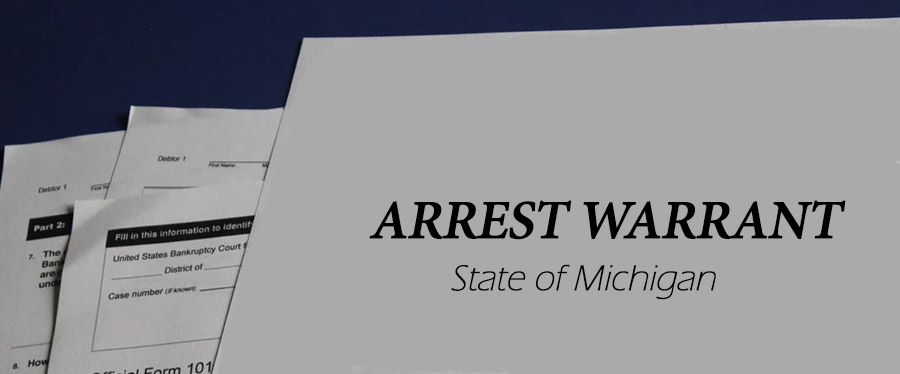“How do I turn myself in on an arrest warrant?”
If a court issues a warrant for your arrest, you want to do everything right to ensure your prompt release from jail on a personal or minimal bond.

Two Types of Warrants: Bench Warrant or Arrest Warrant
Under a newly enacted law in Michigan, an individual subject to arrest on a bench warrant or arrest warrant can turn themselves into the court instead of a police station or jail. Some notable exceptions to this rule include warrants on domestic violence cases and assaultive crimes.
Instead of being arrested, self-surrendering on a warrant is almost always better. A judge or magistrate will set a bond when someone is arrested or self-surrenders on a warrant. A bond can be personal, meaning no money is posted, or require a cash deposit with the court. The judge sets the bond based on the danger the defendant poses to the community and the risk of flight. The more dangerous the judge believes a defendant is to the community or the more likely they believe the defendant will flee, the higher the bond might be set. A judge will be less likely to find that a defendant is dangerous and is unlikely to flee if they self-surrenders.
Two Hour Limit
A judge or magistrate must arraign defendants who voluntarily surrender on a bench warrant or arrest warrant within two hours. People who self-surrender on an arrest warrant are entitled to a “presumption” that they are not a flight risk. If a judge or magistrate is unavailable within two hours, the court’s clerk must set aside the warrant and schedule a date for the defendant to be arraigned.
Exceptions to the Self-Surrender Rule
A defendant charged with domestic violence or an assaultive crime might be required to turn themselves in at a police department or jail. If they appear in court to surrender on an arrest warrant, the two-hour time limit does not apply. It is critical for a defendant to only appear with an experienced criminal defense lawyer to give them the best hope of being released quickly and on a low bond. Assaultive crimes include:
- Threats, assaults, and batteries against family independence agency employees,
- Any felony or misdemeanor assault of any type,
- Carjacking and Robbery,
- Offenses involving explosives, harmful chemicals, biological substances, radioactive material, electronic or electromagnetic devices, offensive or injurious substances or compounds, or combustible substances,
- Offenses related to terrorism,
- Murder, Homicide, Assault with Intent to Murder, and Mayhem,
- Kidnapping, Unlawful Imprisonment, or taking an adult or child hostage, and stalking,
- Criminal Sexual Conduct (CSC), Molestation, Child Abuse, and Rape,
- A crime resulting in miscarriage, stillbirth, or death/harm to an embryo or fetus,
- Home Invasion, and Felonious Discharge of a Firearm.

New Requirement for a Summons
In some instances, judges and magistrates in Michigan must issue a summons instead of issuing a bench warrant or arrest warrant for a new charge. A summons allows the defendant to appear in court voluntarily and not be subject to arrest. An arrest warrant can be issued, instead of a summons, under the following circumstances:
- the complaint is for an assaultive crime or domestic violence,
- the court has reason to believe the defendant will not appear voluntarily,
- a summons poses a risk to public safety,
- or the prosecutor specifically requested a warrant.
A summons must be served on a defendant by personal service, leaving it at the defendant’s home with a responsible adult or mailing it to the defendant’s last known address.
Bench Warrants
When a defendant failed to appear for a court hearing, it was common practice for judges to issue a warrant for the person’s arrest immediately, called a “bench warrant.” Under a recently passed law, the court must now wait 48 hours before issuing a bench warrant to allow the defendant to appear voluntarily. This rule does not apply to defendants charged with domestic violence or other assaultive crimes. Other exceptions to the rule include:
- if the defendant committed a new crime,
- if a person or property would be endangered if a warrant is not issued,
- if prosecution witnesses have been summoned and are present for the hearing,
- if the proceeding is to impose a sentence, or
- if other compelling circumstances require the issuance of a warrant.

Getting a Personal or Reasonable Bond
There are many factors that a judge considers when a defendant is arraigned on a bench or arrest warrant or arraignment following a summons when determining the appropriate bond amount. A bond can be personal, meaning that the defendant merely promises to appear, or the judge can require a cash deposit, a surety from a bondsman, or a 10% deposit.
Defendants have the best chance of getting a low, reasonable bond with an experienced criminal defense lawyer who knows all the factors critical to the judge’s decision. The defense lawyers with LEWIS & DICKSTEIN, P.L.L.C. know how important it is that their clients stay out of jail and on bond. We have decades of experience successfully advocating for personal and low bonds. If you face felony or misdemeanor charges, call us for a free consultation, and we will find a way to help you.
Call us today at (248) 263-6800 for a free consultation or complete an online Request for Assistance Form. We will contact you promptly and find a way to help you.













